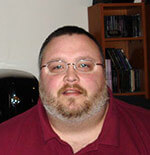If you’ve followed DCT for any length of time I hope our constant efforts to improve the information we provide to you, our readers, has been evident. We strive to provide relevant quality content that is useful to you, and today we take another step in our journey down that road by adding two new authors to our DCT family.
Allow me to introduce to you Bill Rhoads and Barry Heath.
Bill joins DCT with 32 years of experience, including just over 16 years at a major IT company where he progressed from providing desktop support to Advanced Systems Administrator covering several email and database systems. His interest in computers began with a Commodore 64 using the BASIC programming language and has continued with various DOS, Windows, and Linux-based PCs throughout the years. He thoroughly enjoys solving those difficult software or hardware issues! He also has experience with multiple programming languages including BASIC, C, C++, Fortran, Pascal, HTML, LotusScript, and JAVA.
Barry became involved with computers in the mid 1980’s with the Atari line of personal computers and progressed through early Apple Macs. Barry entered the Windows PC arena in the early 2000’s to further his interest in train simulators and the SETI project while providing tech support for a family business. He continues to provide tech support for family and friends to this day. Barry’s interest in Linux began after discovering a Linux install disk tucked into a computer magazine – he was hooked. Today Barry’s use focuses on Ubuntu or Linux Mint with either the Unity or Cinnamon interfaces. Barry is also an avid train fan and motorcyclist.
I’m sure you’ll agree that Bill and Barry are great additions to DCT as we move forward. When you see their articles be sure to stop by and give them a big DCT welcome!


Welcome to both of the new additions.
Just a side note to Bill: my first computer was a Commodore 128. I never really delved into the programming aspects. I was using a spreadsheet app to keep track of 4-H shooting and didn’t need to spend the extra money for an IBM compatible.